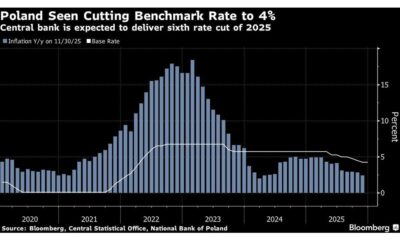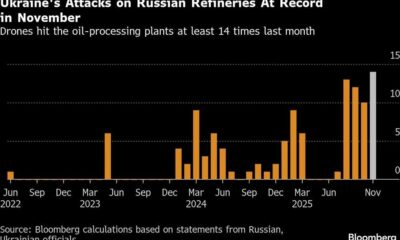Top Stories
French and Spanish Inflation Drops Below Expectations in August

UPDATE: Inflation in France and Spain has fallen below forecasts for August 2023, signaling potential stability for the euro zone as a whole. The latest data reveals that France’s inflation stands at 0.8%, while Spain reports 2.7%, both 0.1 percentage point lower than median estimates in Bloomberg surveys.
This news comes as the European Central Bank (ECB) continues to monitor price growth closely, aiming to maintain its 2% inflation target. The French economy shows signs of weakness compared to its peers, with a notable slowdown in services contributing to the lower inflation rate. Conversely, Spain remains the best-performing major economy in the region.
With the ECB poised to hold interest rates steady at 2% for a second consecutive month, investor confidence remains stable. Analysts are no longer predicting further reductions in borrowing costs this year. The economic resilience in the face of US trade volatility adds to this cautious optimism.
As the situation develops, Friday will see the release of price data from Italy and Germany, both expected to report inflation figures around 2%. This broader assessment will be crucial for understanding the euro zone’s economic landscape.
In France, Prime Minister Francois Bayrou has introduced uncertainty by calling for a confidence vote over budget plans, raising the specter of a government collapse. This political instability could further affect economic performance and consumer confidence.
In the latest consumer-price report, inflation in services has decreased to 2.1%, down from 2.5% the previous month. Additionally, manufactured goods prices have declined by 0.3% for the sixth consecutive month, and energy prices have dropped by 6.2%, although this decline is slightly less severe than in July.
Consumer spending in France also took a hit, with a decrease of 0.3% in July compared to June, driven by reduced expenditures on energy and clothing. This aligns with economic forecasts and reflects the ongoing challenges faced by French consumers.
As these developments unfold, the implications for both French and Spanish economies are significant. The broader euro zone’s reaction to these inflation figures will be closely watched in the coming days, particularly as new data is released. The market awaits updates on how these trends may influence the ECB’s monetary policy moving forward.
Stay tuned for further updates on this evolving story.
-

 Politics4 weeks ago
Politics4 weeks agoSecwepemc First Nation Seeks Aboriginal Title Over Kamloops Area
-

 World5 months ago
World5 months agoScientists Unearth Ancient Antarctic Ice to Unlock Climate Secrets
-

 Entertainment5 months ago
Entertainment5 months agoTrump and McCormick to Announce $70 Billion Energy Investments
-

 Science5 months ago
Science5 months agoFour Astronauts Return to Earth After International Space Station Mission
-

 Lifestyle5 months ago
Lifestyle5 months agoTransLink Launches Food Truck Program to Boost Revenue in Vancouver
-

 Technology3 months ago
Technology3 months agoApple Notes Enhances Functionality with Markdown Support in macOS 26
-

 Lifestyle3 months ago
Lifestyle3 months agoManitoba’s Burger Champion Shines Again Amid Dining Innovations
-

 Top Stories2 months ago
Top Stories2 months agoUrgent Update: Fatal Crash on Highway 99 Claims Life of Pitt Meadows Man
-

 Politics4 months ago
Politics4 months agoUkrainian Tennis Star Elina Svitolina Faces Death Threats Online
-

 Sports5 months ago
Sports5 months agoSearch Underway for Missing Hunter Amid Hokkaido Bear Emergency
-

 Politics5 months ago
Politics5 months agoCarney Engages First Nations Leaders at Development Law Summit
-

 Technology5 months ago
Technology5 months agoFrosthaven Launches Early Access on July 31, 2025





















